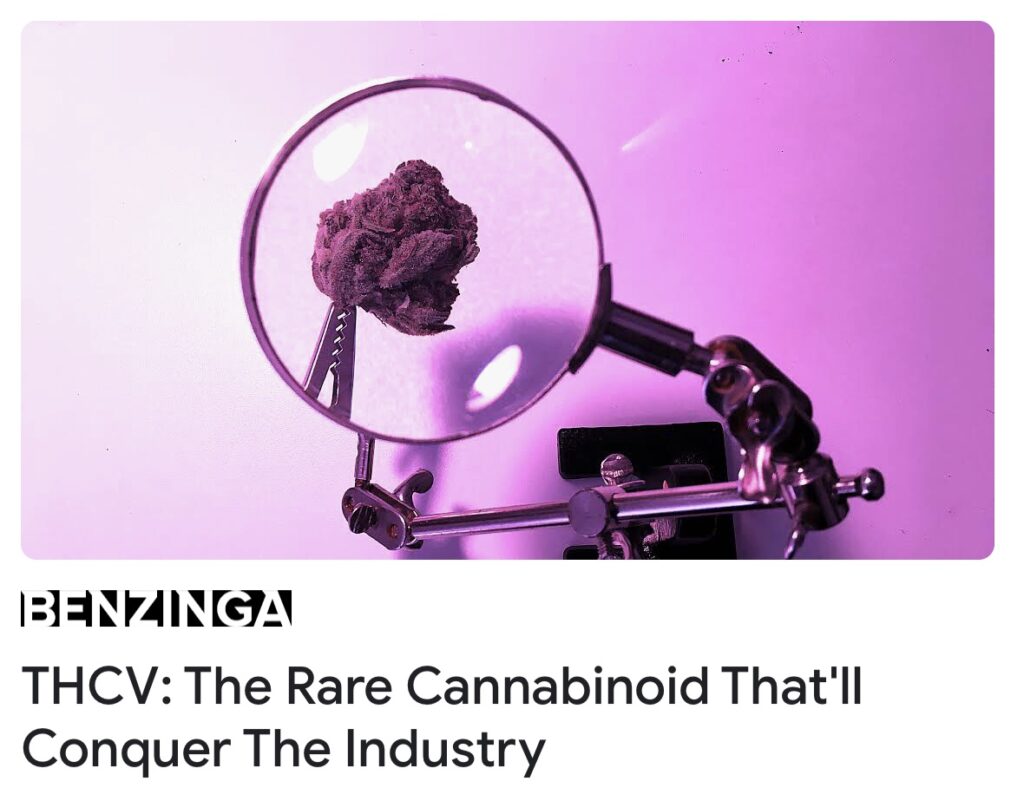
By Maxim Mikheev, CEO and Founder of BIOMEDICAN
Now that one-third of Americans live in a state where recreational cannabis is legal, there’s a booming demand for cannabinoids—the compounds found in the cannabis plant. The most well-known cannabinoids are CBD and THC, but there are actually over 100 known cannabinoids. Many of these cannabinoids have even stronger health benefits than CBD but, up until recently, they have been difficult to produce because they only exist in trace amounts.
Of these rare cannabinoids, THCV is among the most effective and sought after. Not to be confused with THC—the primary psychoactive compound found in cannabis—THCV can treat a variety of conditions, including Alzheimer’s, diabetes, and osteoporosis. THCV also has the potential to disrupt numerous industries, including nutraceuticals, health food, cosmetics, and skincare. This article will explore the unique properties of THCV and what makes it so coveted.
Health Benefits
While THCV has a similar chemical makeup to THC, there are several notable differences, especially in its health benefits. First, THCV is not as psychoactive as THC: while THCV can be psychoactive in high doses, in small to moderate doses, it can actually lessen the high you get from THC. Additionally, THC enhances appetite and can help relieve pain, while THCV suppresses appetite and is more effective as a diabetes medication.
One aspect where THCV’s wellness benefits stand out from other rare cannabinoids is bone health. THCV binds to receptors that regulate bone mass, which gives it the unique ability to prevent bone degeneration and even regrow bone cells; these benefits make THCV a valuable treatment for osteoporosis and other skeletal conditions.
THCV also has applications for mental and neurological ailments. For example, THCV has the ability to reduce panic attacks, as demonstrated by its treatment of anxiety in patients with PTSD. In addition, THCV has the potential to treat Alzheimer’s, as research is showing THCV’s ability to improve tremors, motor controls, and brain lesions associated with this disease.
New Traders Swear By Benzinga Options
We sift through this volatile market for consistent trades so you don’t have to. Get Benzinga Options: Starter Edition to follow Benzinga’s high-conviction options trades.
New Advances
If THCV contains such versatile health benefits, why hasn’t it reached the level of popularity of CBD and THC? The answer is that THCV is incredibly difficult to produce through the traditional method of harvesting rare cannabinoids through plants.
The major problem with producing THCV through plants is that THCV only occurs in trace amounts. This means you need to grow significant quantities of plants to produce only a little amount of THCV, resulting in a labor-intensive and wasteful process. When you factor in harvesting, extraction, and purifying the oil, the costs become very high.
Fortunately, new innovations in biosynthesis are making THCV easier to produce than ever before. Now, cannabinoids can be synthesized without plants, resulting in shorter production cycles, less labor and energy, and higher yields. The final result is a pharmaceutical grade, non-GMO, organic product that’s 70-90 percent less expensive than wholesale prices. Biosynthesis is also more sustainable than plants, using 90 percent less natural resources and energy.
Industry Applications
With these innovations, THCV will become a more frequent and less expensive presence in the cannabinoid market. Soon, THCV will be the target of large distribution networks at both online and retail locations in nutraceuticals, cosmetics, and skincare, with all these industries adding THCV to their existing product lines or developing new product lines around it.
THCV produced through biosynthesis can also be added to any edible with zero modifications, which will give it a major advantage in the food and beverage industry. Health food companies will be able to add THCV to a variety of foods and beverages, including protein bars, chocolates, cereals, granola bars, and sports drinks.
The biosynthetic cannabinoid market is expected to reach $10 billion by 2025. With its strong health properties and applications to numerous industries, THCV will represent one of the top three cannabinoids in market share.
Maxim Mikheev is CEO and Founder ofBIOMEDICAN, a biotech startup designing patented low-cost methods of growing high-value compounds at scale with proprietary yeasts.
Benzinga‘s Related Links:
- What Are The Most Abundant Cannabinoids?
- Is The Cannabis Market Ready For Lab-Grown Cannabinoids?
- The Next Big Cannabinoids
- The preceding article is from one of our external contributors. It does not represent the opinion of Benzinga and has not been edited.
- Photo: Javier Hasse.
These Stocks Are Beating this Market!
Looking for trades that can weather the storm? Benzinga Stock Picks deliver hedge-fund trades to you every month.
Featuring detailed analysis and ridiculously easy trade setups.
Click here to subscribe to Benzinga Stock Picks now.
© 2020 Benzinga.com. Benzinga does not provide investment advice. All rights reserved.
